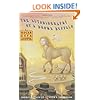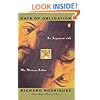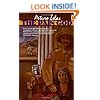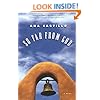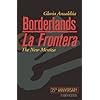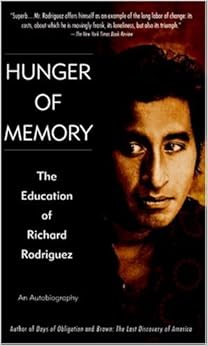



Hunger of Memory : The Education of Richard Rodriguez Mass Market Paperback – January 1, 1983

Don't have a Kindle? Get your Kindle here, or download a FREE Kindle Reading App.
Product Details
Would you like to update product info or give feedback on images?.
|
Editorial Reviews
Review
“Superb autobiographical essay ... Mr. Rodriguez offers himself as an example of the long labor of change: its costs, about which he is movingly frank, its loneliness, but also its triumph.”—New York Times Book Review
From the Publisher
Here is the poignant journey is a "minority student" who pays the cost of his social assimilation and academic success with a painful alienation -- from his past, his parents, his culture -- and so describes the high price of "making it" in middle class America.
Provocative in its positions on affirmative action and bilingual education, Hunger Of Memory is a powerful political statement, a profound study of the importance of language... and the moving, intimate portrait of a boy struggling to become a man.
"Arresting...Splendidly written intellectual autobiography." -- Boston Globe
"Superb autobiographical essay... Mr. Rodriguez offers himself as an example if the long labor of change: its costs, about which he is movingly frank, its loneliness, but also its triumph." -- The New York Times Book Review
More About the Author
Customer Reviews
Most Helpful Customer Reviews
Likewise, the impact and influence that his early Catholic parochial school experience had on him resonated with me, as I myself was a product of such schooling. His reminiscences brought back many memories for me, most of them positive ones, despite some of the obvious pitfalls inherent in that sometimes narrow, parochial education framework that often favored rote learning over intellectual or critical thinking. Indeed, his love of reading, as is mine, emanated from that early educational experience, which greatly emphasized reading. The impact and influence that Catholicism had on him had are fertile grounds for discussion in the context of liturgical reform and its effects upon community. As a Catholic having lived through the reforms initiated by Vatican II, I understand and appreciate his analysis on the demystification of the liturgy and the loss of the mystical in its transition from Latin into a vernacular language in its celebration of the concept of community.Read more ›
The book itself is an abstract approach to the original structure of an autobiography. It lacks the voluminous accounts of monthly or yearly accomplishments (Colin Powell `My American Journey' or Bill Clinton's `My Life' come to mind). Rather, the author takes on a path of moral reflection on the time it took one boy to become a man and the education it took to transform one's identity. He assembles a combination of essays through which via a free flowing narrative, he conducts self-examination over the emergence of his `public' character and the replacement of his `private' persona.
But there is something else in this book. There is longing. Longing for the days when the 'sounds' of his family brought meaning and recognition for what he was meant to be, for where he was meant to go (or was that a childhood illusion?). A reader would find it difficult to ignore the author's emotional yearning for the past for a childhood now gone, when love, and family, and values, and identity made sense.
Mr. Rodriguez has done a superb job of capturing with words what many of us (first or second generation Americans) feel as members of families with similar backgrounds.
I highly recommend this book.
-by Simon Cleveland
